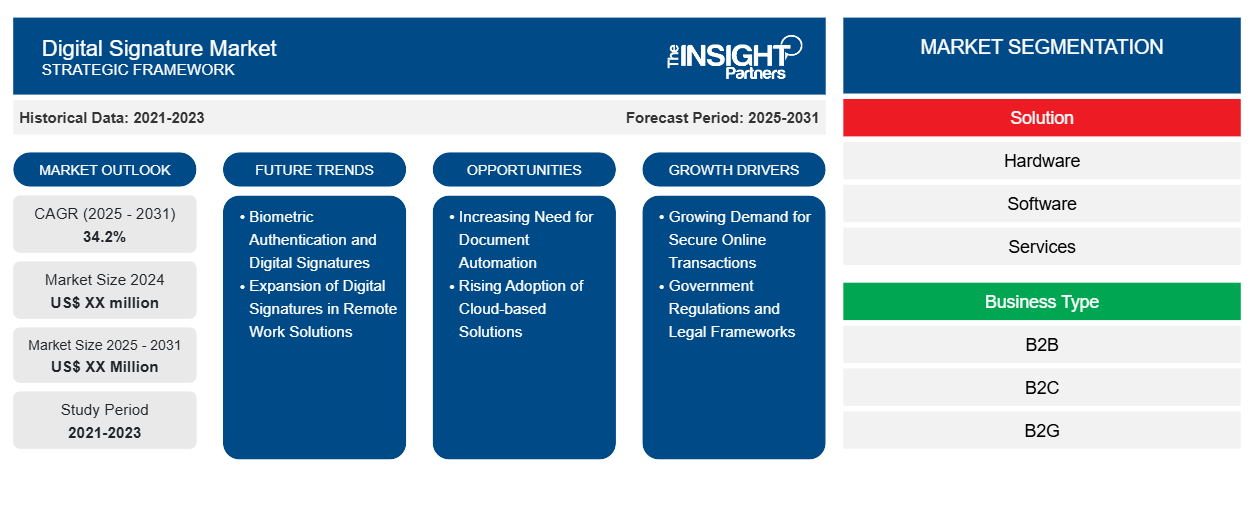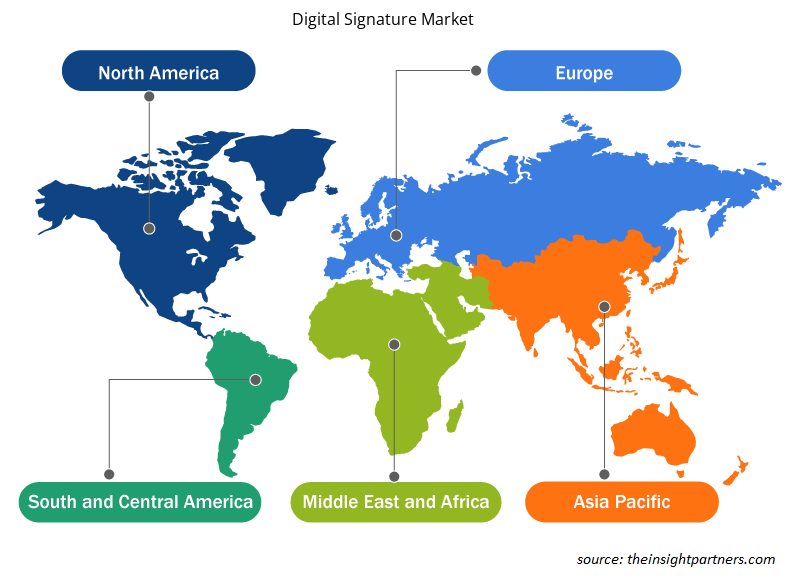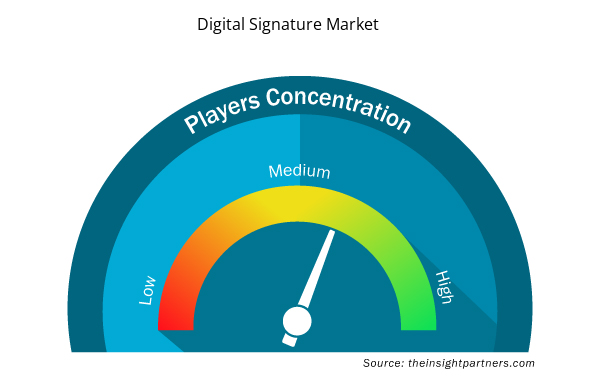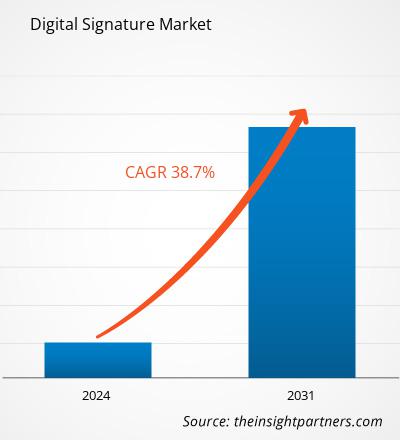The digital signature market size was valued at US$ 5.45 billion in 2024 and is expected to reach US$ 53.60 billion by 2031; it is estimated to record a CAGR of 38.7% from 2024 to 2031. Integration with cloud-based security solutions is likely to remain a key market trend in the coming years.
Digital Signature Market Analysis
Factors such as rising digital fraud incidences, the flourishing e-commerce sector, and the preference for remote work models drive the digital signature market growth. The market is expected to grow during the forecast period owing to the establishment of e-signature laws and the increasing adoption of mobile signatures. The integration with cloud-based security solutions is emerging as a key trend in the market. However, limitations on document and recipient settings hamper the digital signature market growth.
Digital Signature Market Overview
A digital signature is a specialized electronic signature that adheres to strict legal regulations, providing the highest level of assurance in verifying the identity of signers and securely associating them with the signed document. It uses Public Key Infrastructure (PKI) standards to ensure robust security, making it a trusted technology for authenticating digital transactions. Digital signatures are widely used in applications such as financial transactions, software distribution, and contract management, where document authenticity is critical, preventing forgery or tampering. By employing cryptographic techniques, digital signatures verify the integrity and authenticity of messages or documents, serving as a secure digital equivalent to a handwritten signature or stamped seal. Key aspects of digital signatures include authenticity, ensuring the source of a document is verified; integrity, confirming that the document has not been altered in transit; and security, offering high-level protection through PKI standards and digital certificates for identity verification. Digital signatures hold legal significance in many countries, creating binding agreements similar to traditional handwritten signatures. They are a vital part of electronic authentication, ensuring non-repudiation.
Customize This Report To Suit Your Requirement
You will get customization on any report - free of charge - including parts of this report, or country-level analysis, Excel Data pack, as well as avail great offers and discounts for start-ups & universities
Digital Signature Market: Strategic Insights

- Get Top Key Market Trends of this report.This FREE sample will include data analysis, ranging from market trends to estimates and forecasts.
Customize This Report To Suit Your Requirement
You will get customization on any report - free of charge - including parts of this report, or country-level analysis, Excel Data pack, as well as avail great offers and discounts for start-ups & universities
Digital Signature Market: Strategic Insights

- Get Top Key Market Trends of this report.This FREE sample will include data analysis, ranging from market trends to estimates and forecasts.
Digital Signature Market Drivers and Opportunities
Flourishing E-Commerce Sector Propels Market Growth
Over the past decade, global business-to-business (B2B) e-commerce has experienced consistent growth. This trend is driven by the ongoing digital transformation of industries worldwide, as more businesses embrace e-commerce platforms to streamline operations, improve supply chains, and enhance customer experiences. According to the International Trade Administration, the global B2B e-commerce market is projected to reach a staggering value of US$ 36 trillion by 2026, highlighting the immense scale and potential of this sector. The rapid expansion of B2B e-commerce has revolutionized how businesses interact; many of them now prefer digital transactions owing to their efficiency, scalability, and cost-effectiveness. As businesses continue to embrace online platforms for goods sale and purchase, the need for robust digital security solutions has also intensified. This shift to digital transactions underlines the risk of cyber threats and fraud, in turn, propelling the demand for advanced security measures such as digital signatures to ensure the authenticity, integrity, and non-repudiation of online agreements.
A significant rise in e-commerce sales underscores the shift toward online transactions, further emphasizing the need for robust digital security solutions such as digital signatures to ensure the security and authenticity of online transactions. Digital signatures provide a reliable solution by ensuring the integrity and non-repudiation of electronic documents, such as payment authorizations, invoices, and purchase agreements. This enhanced security is crucial for maintaining consumer trust and reducing fraud risks in e-commerce transactions. Thus, the surging need for secure digital interactions with the rapid growth of the e-commerce industry bolsters the digital signature market as businesses seek to protect customer data and keep a check on fraud in a rapidly evolving digital landscape.
Establishment of E-Signature Laws to Generate Growth Opportunities in Market
The rising e-signature laws present a significant growth opportunity in the digital signature market, as they are likely to provide legal validation and fuel adoption across sectors. With a strong focus on security, compliance, and international interoperability, digital signature providers can position themselves as key enablers of digital transformation. In the US, digital signatures utilize e-certificates from Trust Service Providers (TSPs), such as Certificate Authorities (CAs), to authenticate the signer’s identity. These certificates serve as proof of signing by attaching the digital certificate associated with each signature to the document through encryption. Furthermore, the ESIGN Act (i.e., Electronic Signatures in Global and National Commerce Act) grants electronic signatures the same legal standing as handwritten signatures across the US, streamlining and expediting how organizations gather, track, and manage approvals on contracts and documents. The act defines an electronic signature as “an electronic sound, symbol, or process, attached to or logically associated with a contract or other record and executed or adopted by a person with the intent to sign the record,” thereby recognizing electronic signatures as a valid method, indicating an agreement to a contract.
Further, eIDAS – European Union Regulation No 910/2014 – provides a legal framework for electronic identification and trust services across the EU. The scope of eIDAS entails qualified electronic signatures (QES), which are legally equivalent to handwritten signatures, to ensure that electronic signatures such as QES meet strict security and authenticity standards. Additionally, the GDPR (General Data Protection Regulation) guarantees that personal data used in digital signing processes is securely stored and processed in accordance with European data protection laws, safeguarding individuals’ privacy rights. Thus, the establishment of e-signature laws is expected to bolster the demand for digital signing software and solutions in the coming years.
Digital Signature Market Report Segmentation Analysis
Key segments that contributed to the derivation of the digital signature market analysis are offering, type, and end user.
- In terms of offering, the market is bifurcated into solutions and services. The solutions segment dominated the market in 2024.
- Based on type, the digital signature market is segmented into simple digital signature, basic digital signature, advanced electronic signature (AES), and qualified electronic signature (QES). The advanced electronic signature (AES) segment dominated the market in 2024.
- By end user, the market is divided into BFSI, government, legal, and others. The BFSI segment dominated the market in 2024.
Digital Signature Market Share Analysis by Geography
- The digital signature market is segmented into five major regions: North America, Europe, Asia Pacific (APAC), the Middle East & Africa (MEA), and South & Central America. North America dominated the market in 2023, followed by Europe and Asia Pacific.
- The North America digital signature market is segmented into the US, Canada, and Mexico. The market in this region is expanding rapidly due to the high adoption of advanced technologies and an upsurge in demand for secure and efficient digital authentication. The US, in particular, leads the market due to the growing emphasis on regulatory compliance and the need for secure online transactions across the finance, healthcare, and government sectors, among others. The presence of key players such as DocuSign and Adobe in the digital signature industry further contributes to the region’s dominance, while stringent data protection regulations such as the Electronic Signatures in Global and National Commerce (ESIGN) Act and the Uniform Electronic Transactions Act (UETA) foster market growth.
Digital Signature Market Regional Insights
The regional trends and factors influencing the Digital Signature Market throughout the forecast period have been thoroughly explained by the analysts at Insight Partners. This section also discusses Digital Signature Market segments and geography across North America, Europe, Asia Pacific, Middle East and Africa, and South and Central America.

- Get the Regional Specific Data for Digital Signature Market
Digital Signature Market Report Scope
| Report Attribute | Details |
|---|---|
| Market size in 2024 | US$ 5.45 Billion |
| Market Size by 2031 | US$ 53.60 Billion |
| Global CAGR (2024 - 2031) | 38.7% |
| Historical Data | 2021-2023 |
| Forecast period | 2025-2031 |
| Segments Covered |
By Offering
|
| Regions and Countries Covered | North America
|
| Market leaders and key company profiles |
Digital Signature Market Players Density: Understanding Its Impact on Business Dynamics
The Digital Signature Market market is growing rapidly, driven by increasing end-user demand due to factors such as evolving consumer preferences, technological advancements, and greater awareness of the product's benefits. As demand rises, businesses are expanding their offerings, innovating to meet consumer needs, and capitalizing on emerging trends, which further fuels market growth.
Market players density refers to the distribution of firms or companies operating within a particular market or industry. It indicates how many competitors (market players) are present in a given market space relative to its size or total market value.
Major Companies operating in the Digital Signature Market are:
- Zoho Corp Pvt Ltd
- PandaDoc, Inc.
- DocuSign Inc.
- Adobe Inc
- GlobalSign, Inc.
- Signicat
Disclaimer: The companies listed above are not ranked in any particular order.

- Get the Digital Signature Market top key players overview
Digital Signature Market News and Recent Developments
The digital signature market is evaluated by gathering qualitative and quantitative data post primary and secondary research, which includes important corporate publications, association data, and databases. A few of the developments in the market are listed below.
- Signaturit Group announced its plan to acquire Validated ID, a leading provider of innovative digital identity and electronic signature solutions. The acquisition of Validated ID brings significant strategic advantages to Signaturit Group, further solidifying its position as a leader in the European digital trust market.
(Source: Signaturit Group, Press Release, February 2025)
- Signicat announced its participation in the WE BUILD (Wallet Ecosystem for Business & Payment Use cases, Identification, Legal person representation, and Data sharing) consortium. By facilitating the verification of business credentials and issuing attestations to any wallet within Europe, Signicat enhances trust and efficiency in digital B2B transactions. The European Commission has selected this initiative for the second round of large-scale pilots to deploy the EU Digital Identity Wallet.
(Source: Signicat, Press Release, February 2025)
Digital Signature Market Report Coverage and Deliverables
The "Digital Signature Market Size and Forecast (2021–2031)" provides a detailed analysis of the market covering the areas mentioned below:
- Digital signature market size and forecast at global, regional, and country levels for all the key market segments covered under the scope
- Digital signature market trends as well as market dynamics such as drivers, restraints, and key opportunities
- Detailed PEST and SWOT analysis
- Digital signature market analysis covering key market trends, global and regional framework, major players, regulations, and recent market developments
- Industry landscape and competition analysis covering market concentration, heat map analysis, prominent players, and recent developments for the digital signature market
- Detailed company profiles
- Historical Analysis (2 Years), Base Year, Forecast (7 Years) with CAGR
- PEST and SWOT Analysis
- Market Size Value / Volume - Global, Regional, Country
- Industry and Competitive Landscape
- Excel Dataset



Report Coverage
Revenue forecast, Company Analysis, Industry landscape, Growth factors, and Trends

Segment Covered
Solution, Business Type, Industry, and Geography

Regional Scope
North America, Europe, Asia Pacific, Middle East & Africa, South & Central America

Country Scope
This text is related
to country scope.
Frequently Asked Questions
The key players, holding majority shares, in digital signature market includes Docusign, Inc; Adobe; Thales; Entrust Corporation; and Zoho Corporation Pvt. Ltd.
The North America held the largest market share in 2024, followed by Europe and APAC.
The digital signature market was valued at US$ 5.45 billion in 2024 and is projected to reach US$ 53.60 billion by 2031; it is expected to grow at a CAGR of 38.7% during 2025–2031.
The digital signature market is expected to reach US$ 53.60 billion in the year 2031.
Integration with cloud-based security solutions is the future trends of the digital signature market.
Rising digital fraud incidents, flourishing e-commerce sector, and preference for remote working are the driving factors impacting the digital signature market.
Trends and growth analysis reports related to Technology, Media and Telecommunications : READ MORE..
The List of Companies - Digital Signature Market
- Zoho Corp Pvt Ltd
- PandaDoc, Inc.
- DocuSign Inc.
- Adobe Inc
- GlobalSign, Inc.
- Signicat
- Signaturit Group
- Yousign SAS
- Autenti. Sp. z o.o.
- Penneo A/S
- Oneflow AB (publ)
- GetAccept Inc.
- Skribble AG
- Namirial S.p.A.

 Get Free Sample For
Get Free Sample For